Rorty and Beyond
Copyright 2020. Lexington Books. All rights reserved. May not be reproduced in any form without permission from the publisher, except fair uses permitted under U.S. or applicable copyright law.
EBSCO Publishing : eBook Collection (EBSCOhost) - printed on 3/11/2020 6:21 AM via MCGILL UNIV
AN: 2377032 ; Auxier, Randall, Kramer, Eli, Skowronski, Krzysztof Piotr, Sartwell, Crispin, Maecki, Wojciech, Madzia, Roman, Hogan, Brendan, Kilanowski, Marcin, Kegley, Jacquelyn Ann K., Ryder, John.; Rorty and Beyond
Account: s1226075
Rorty and Beyond
Edited by
Randall Auxier, Eli Kramer, and Krzysztof Piotr Skowroski
LEXINGTON BOOKS
Lanham Boulder New York London
EBSCOhost - printed on 3/11/2020 6:21 AM via MCGILL UNIV. All use subject to https://www.ebsco.com/terms-of-use
Published by Lexington Books
An imprint of The Rowman & Littlefield Publishing Group, Inc.
4501 Forbes Boulevard, Suite 200, Lanham, Maryland 20706
www.rowman.com
6 Tinworth Street, London SE11 5AL, United Kingdom
Copyright 2020 by The Rowman & Littlefield Publishing Group, Inc.
All rights reserved . No part of this book may be reproduced in any form or by any electronic or mechanical means, including information storage and retrieval systems, without written permission from the publisher, except by a reviewer who may quote passages in a review.
British Library Cataloguing in Publication Information Available
Library of Congress Cataloging-in-Publication Data Available
ISBN: 978-0-7391-9508-6 (cloth : alk. paper)
ISBN: 978-0-7391-9509-3 (electronic)
 The paper used in this publication meets the minimum requirements of American National Standard for Information SciencesPermanence of Paper for Printed Library Materials, ANSI/NISO Z39.48-1992.
The paper used in this publication meets the minimum requirements of American National Standard for Information SciencesPermanence of Paper for Printed Library Materials, ANSI/NISO Z39.48-1992.
EBSCOhost - printed on 3/11/2020 6:21 AM via MCGILL UNIV. All use subject to https://www.ebsco.com/terms-of-use
Contents
Randall Auxier
Eli Kramer
Crispin Sartwell
Wojciech Maecki
Roman Madzia
Krzysztof Piotr Skowroski
Brendan Hogan
Marcin Kilanowski
Jacquelyn Ann K. Kegley
John Ryder
Kenneth W. Stikkers
Justin Bell
Roberto Gronda
Maja Niestrj
Radim p
Mikls Nyr
Preston Stovall
David Beisecker
John Shook
Randall Auxier
EBSCOhost - printed on 3/11/2020 6:21 AM via MCGILL UNIV. All use subject to https://www.ebsco.com/terms-of-use
The present volume is not the proceedings of a conference. A good number of the contributions here (something approaching half) were written after the conference I will describe and written specifically for this volume and its central themes, which will be well described by Eli Kramer in his introduction. But the idea did begin with a conference and with what we learned from it. I wish to recount and document that idea and how it has developed.
The long-running series of meetings on American and European Values at Opole University (in southwestern Poland), organized by Chris Skowronski, has been a tremendously valuable contribution to the opening of dialogue between American philosophy and European interest in it. Our dialogue has been based on common as well as contrasting values. Hundreds of scholars from the United States and all across Europe have used this opportunity to come to an understanding of one another. We learn and are often surprised by how much we have in common, but also by the unanticipated differences.
Along the way, Chris asked me what we could do together that would further the goals of his series. At that time, I was entering the final stages of editing The Philosophy of Richard Rorty as the thirty-second volume of the Library of Living Philosophers. Rorty had passed away only the year before and I said to Chris that I didnt think we should do a conference on Rortyheaven knows he has been discussed. Instead, I suggested that we should do a conference on how Rorty changed academic and public philosophy and what future it has suggested or opened for those of us who inherit his efforts, for better and for worse. Chris was enthusiastic about this idea.
For various reasons, it was 2013 before we could actually schedule such a conference. The conferences on American and European are complex to organize. While they receive some subsidy from Opole University (importantly providing space for meetings), the invited scholars have to provide their own travel, hotel, and other expenses. A tremendous amount of advance notice and a fair amount of persuasion go into convincing people to approach their universities and other sources of assistance to make the expensive journey from the United States and elsewhere in Europe.
Chris has been extraordinarily successful in gathering high-level scholars from all parts of Europe, while saving room for important young voices. As the co-host from the United States, it was my job to select and recruit the North Americans. Due to the previous success of the conferences and their excellent reputation, I had no problem getting the commitment of some of the best scholars in the area, all of whom had in common an intimate familiarity with Rortys thought and an understanding that the time has come to build upon what he achieved in transforming academic philosophy, while discarding the mere controversy and the numerous nonviable suggestions he made. I think everyone who attended the conference will agree that the exchanges were outstanding and that much was learned by all thirty who came to the week-long event. We did not all agree on what Rorty achieved, but I think we all saw that the ground had been cleared for something different. Nearly all of us were, I think, appreciative of the clearing.
The chapters in this volume which were taken from that conference have been reworked around this idea of something beyond, of taking stock of the opportunity and working in some further direction. One might call it post-pragmatism. That name would not be accepted by all contributors here, and mainly because some will not allow that Rorty was a pragmatist, let alone the one who fulfilled the prospects of pragmatism. Yet, no one can deny that the world we now write in is one in which Rorty defined what pragmatism would be, and what it has become. To write beyond Rorty is to address a world whose idea of pragmatism was formed by his work. To write in opposition or in welcome to that context still involves addressing ones self to it. This, I think, is what we do in this volume. The chapters written after that conference, including my own, have been formed around this idea of a post-pragmatic beyond. They have been woven and edited into a continuous inquiry into the future: now that Rorty has done what he could, what should we do next? The issue of what hope there may be for philosophy within academia and beyond dominates this volume.
We live in a time of massive transition in higher education and in the way that information within a culture is transmitted to the following generations. Uncertainty about the role of the older organs of transmissionour complex universities, public or private, that interact with a massive publishing industry and a huge commercial, governmental, and industrial superstructure to provide highly skilled labor and high-level research. This familiar combination of activities, the pretensions of which Rorty attacked without mercy, is coming to an end. In a way, the conceits of the philosophy departments have been the very symbol of the outlook that cannot be further believed or sustained. The vacuous academic privilege that masked itself in a persona of science has been exposed as a dying descendent of the scholastic charade that Descartes took down. In fact, Rorty might fairly be called the Descartes of the modern age, who taught us about the Cartesian project what Descartes taught us about scholasticism. The scholasticism of the scientistic era has genuinely collapsed into a heap of no-longer-believable claims to objective rationality. As with Augustine and Aquinas before him, Descartes deserved a better destiny than the one he received at the hands of history. But history is cruel.

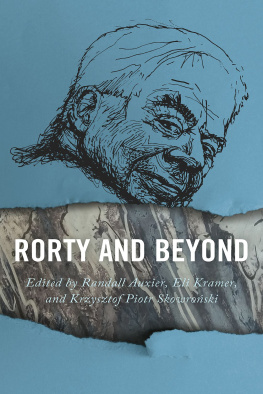

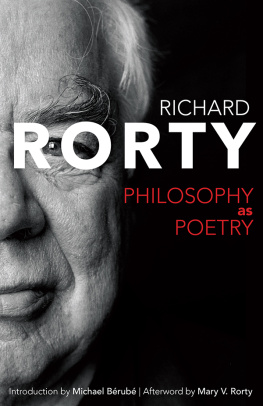
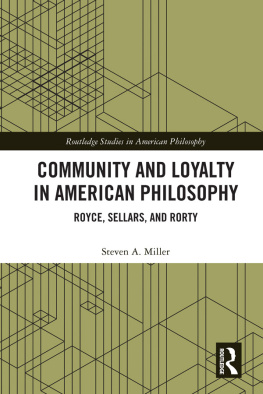
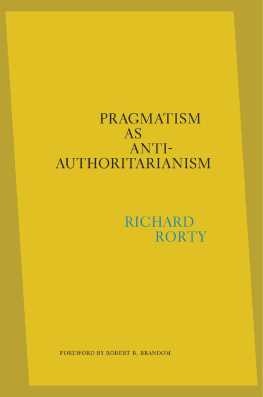
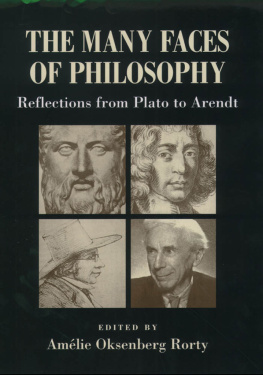
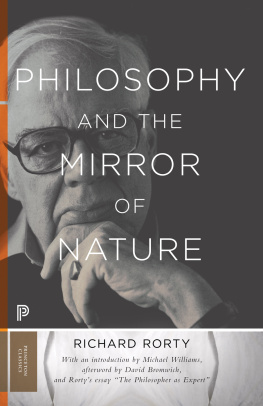
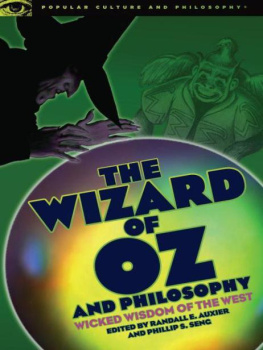

 The paper used in this publication meets the minimum requirements of American National Standard for Information SciencesPermanence of Paper for Printed Library Materials, ANSI/NISO Z39.48-1992.
The paper used in this publication meets the minimum requirements of American National Standard for Information SciencesPermanence of Paper for Printed Library Materials, ANSI/NISO Z39.48-1992.